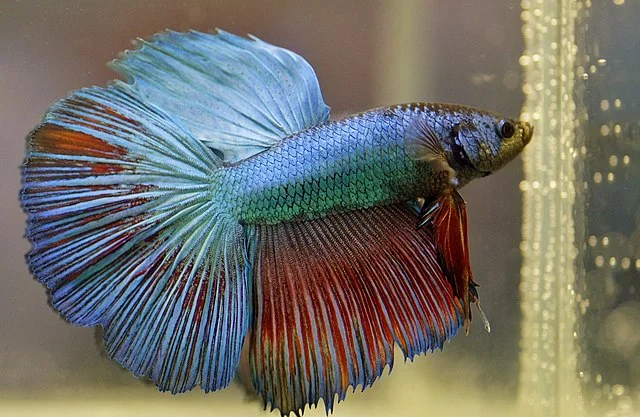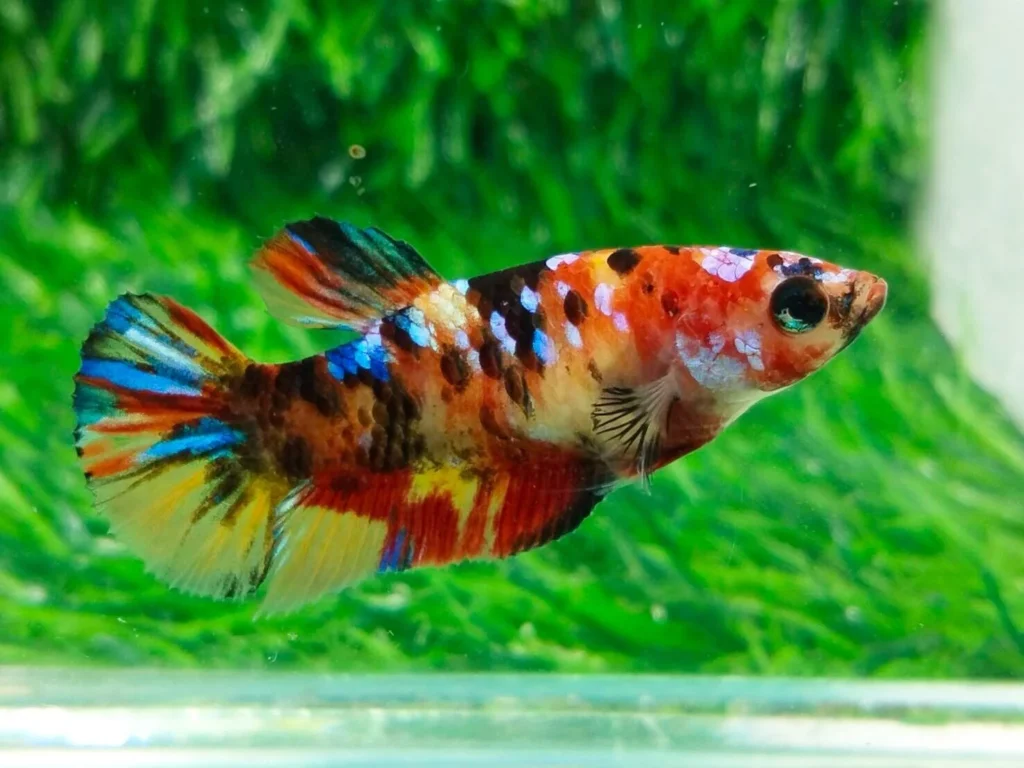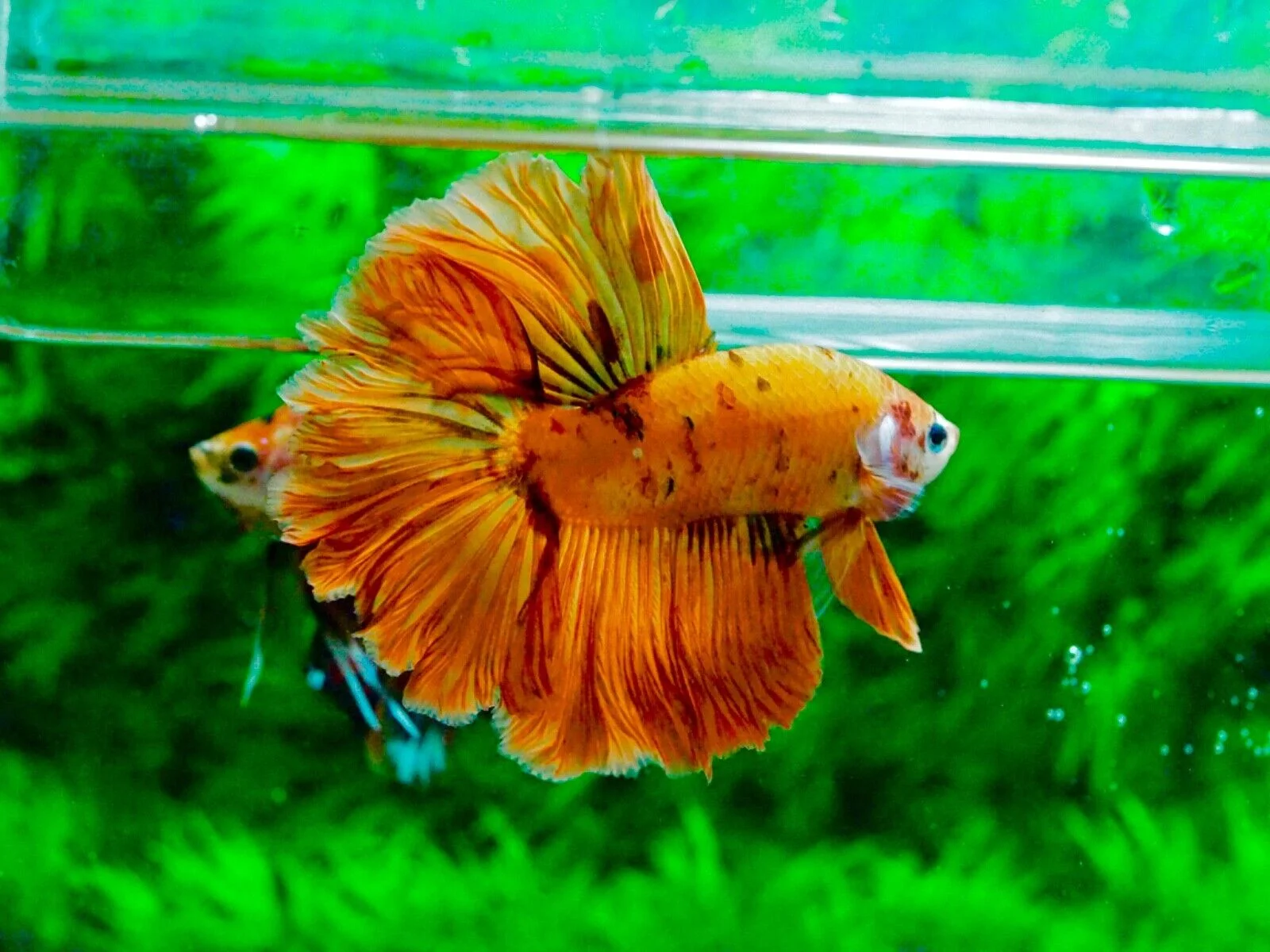Betta Fish (Betta Splendens)
Betta fish have long been one of my favorite aquarium fish and they make a great beginner fish. You’ll find these guys in virtually every fish store in the United States, and their popularity is well warranted. Ask any experienced betta owner and they’ll tell you how personable and intelligent betta fish are.
However, it’s very important to understand how to properly care for these beautiful creatures. Often times people will become betta owners before being familiar with aquarium care principles and have to learn on the fly. Our goal is to help equip owners with the knowledge necessary to give their fish the best life possible.
This betta fish care guide will equip you with the knowledge necessary to successfully keep betta fish and ensure their health and well-being. I’ll delve into various aspects of betta fish care, encompassing tank setup, feeding, water conditions, and addressing common health issues.
Betta Fish Species Overview
Adult Size: 2.5-3 inches
Lifespan: 2-3 years
Diet: Carnivorous
Care Level: Easy
Minimum Tank Size: 5 gallons
Temperature: 75-82°F (24-28°C)
pH: 6.5-7.5
Origin: Southeast Asia
Betta Tank Setup
The initial and pivotal step in the care of betta fish is the establishment of an appropriate tank environment. Given that betta fish are tropical in nature, maintaining a tank temperature between 75-82°F (24-28°C) is imperative.
A minimum tank size of 5 gallons is recommended, affording ample space for your betta to swim and explore. Enhance the tank with live plants, aquatic wood, and hiding spots to create a stimulating and comfortable habitat for your betta.

Betta Feeding
Ensuring the proper nutrition of your betta fish is paramount to its overall well-being. Being carnivorous, betta fish should be fed a high-quality, betta-specific pellet or flake food. Feed your betta small portions twice a day, ensuring that you only provide what the fish can consume within a minute or less.
Guard against overfeeding, as it can lead to obesity and other health complications. Additionally, supplement their diet with occasional treats such as frozen or live bloodworms, brine shrimp, or daphnia for added nutritional variety.
Optimal Water Conditions
The maintenance of optimal water conditions is critical to the health of your betta fish. Utilize a water conditioner to eliminate chlorine and chloramine from tap water before introducing it to the tank. Regularly assess water parameters, including temperature, pH level, ammonia, nitrite, and nitrate levels.
Ideal conditions for betta fish include a pH level between 6.5-7.5 and ammonia and nitrite levels at 0 ppm. Execute routine water changes of 25-50% weekly to sustain a clean environment free from harmful toxins.

Common Betta Health Issues
While betta fish are generally robust, they can still be susceptible to certain health concerns. Recognizable ailments include fin rot, ich, and swim bladder disorder. Fin rot manifests as the deterioration of the betta’s fins, while ich presents as distinct white spots on the fish’s body. Swim bladder disorder can cause difficulties in swimming or result in the fish floating on one side.
Immediate action is crucial when signs of illness emerge. Quarantine the affected fish, maintain pristine water conditions, and consider consulting a veterinarian specializing in fish health for expert guidance.
Betta Tank Filtration Systems
Ensuring the vitality of your betta fish involves not only maintaining an optimal water temperature but also guaranteeing pristine water conditions through effective filtration systems. Quality filtration plays a pivotal role in removing debris, excess waste, and harmful toxins from the tank, contributing to a healthier aquatic environment.
Consider incorporating a reliable filter system that matches the size of your tank, providing mechanical, chemical, and biological filtration. Regularly cleaning or replacing filter media is essential to uphold the efficiency of the system and safeguard the well-being of your betta fish.

Betta Tankmates and Compatibility
While betta fish are known for their vibrant personalities, it’s essential to be mindful of their territorial nature when considering tankmates. Some species may coexist harmoniously with bettas, while others may trigger aggression. Explore suitable tank companions, such as peaceful community fish like tetras or bottom-dwelling species like corydoras.
Introducing tankmates of similar size and temperament, along with providing sufficient hiding spaces, helps minimize potential conflicts. Vigilance and observation are key as you introduce new tankmates to ensure a cohesive and stress-free aquatic community.
Breeding and Reproduction
For those interested in expanding their betta fish family, understanding the intricacies of breeding and reproduction is paramount. Set up a separate breeding tank equipped with appropriate nesting sites and ample hiding spots. Betta courtship rituals involve elaborate displays by the male to attract the female. Once successful, the female will lay eggs, and the male will diligently guard the nest.
Separating the fry from the adults is crucial, and providing a diet suitable for the delicate fry is essential for their growth and development. Delve into the fascinating world of betta fish reproduction with careful consideration and preparation for a rewarding breeding experience.
Betta Fish Care Summary
To put it briefly, this Betta Fish Care Guide offers crucial information to both inexperienced and seasoned owners, helping them to maintain the best possible health and wellbeing for their fish. From meticulous tank setup, feeding practices, and water condition maintenance to addressing health concerns and exploring advanced topics like filtration systems, tank mates, and breeding, this guide covers the spectrum of responsible betta fish care.
By adhering to these guidelines, you’re poised to create an environment that mirrors the natural habitat of betta fish, promoting longevity and vibrancy. The shared practices ensure not just physical well-being but also enhance the joy derived from these captivating aquatic companions.

